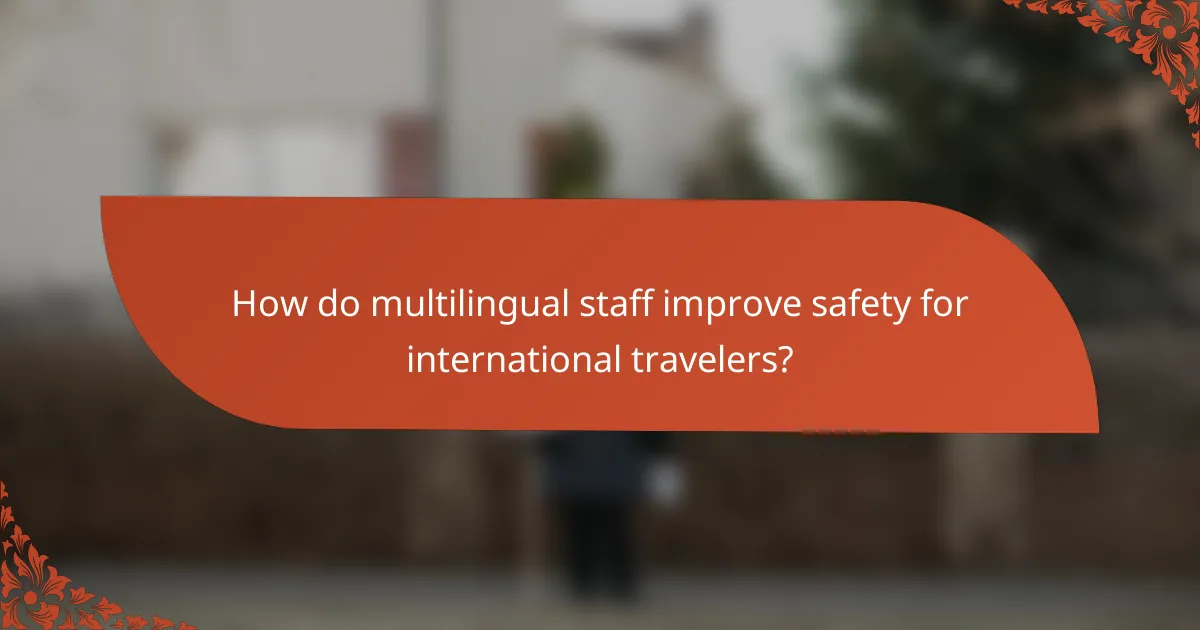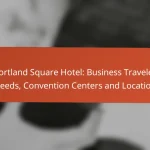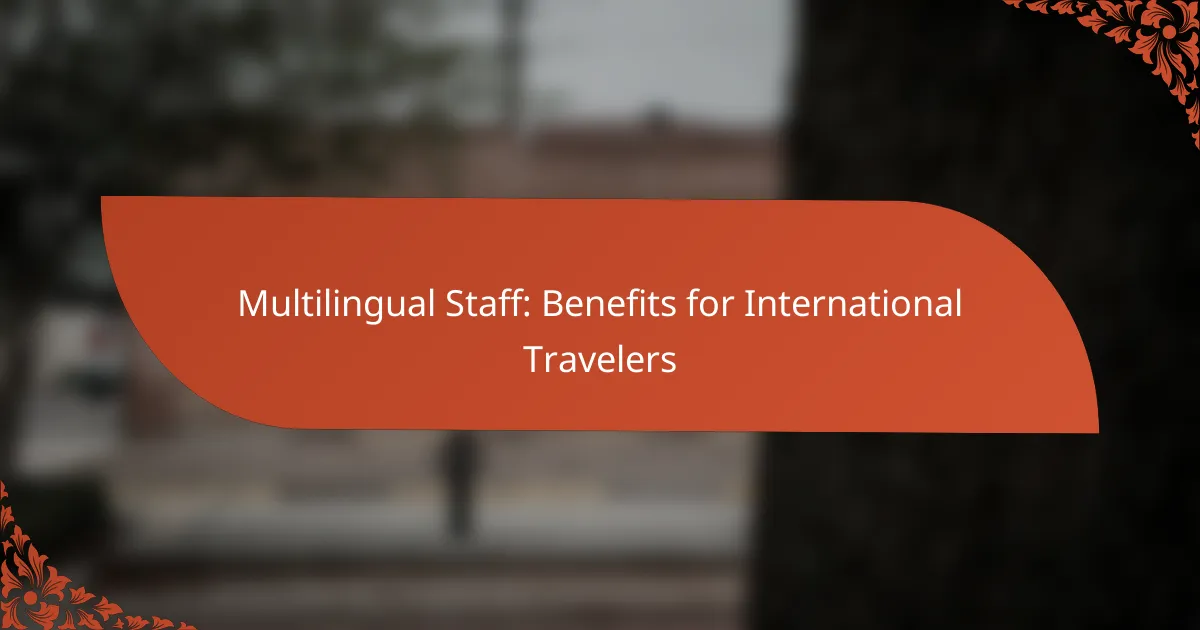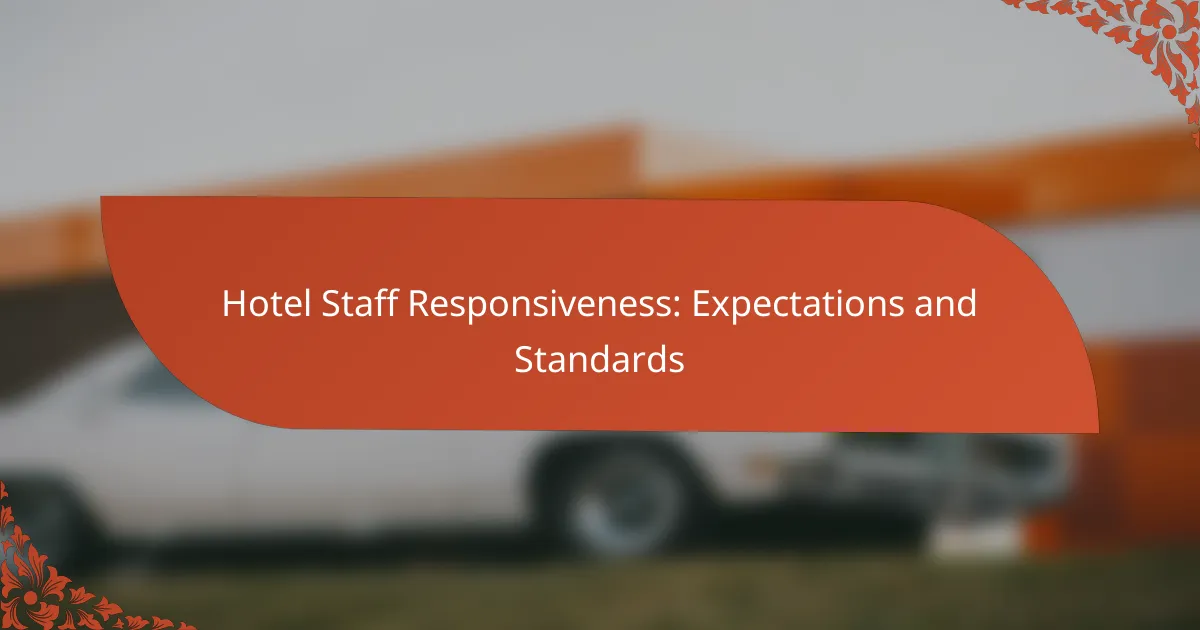Multilingual staff play a crucial role in enhancing the travel experiences of international travelers by ensuring effective communication and fostering cultural understanding. Their ability to connect with diverse clients not only improves service quality but also builds trust and loyalty, making journeys smoother and more enjoyable. Additionally, these language skills contribute to traveler safety by clarifying local laws and customs, helping prevent misunderstandings during critical situations.

How can multilingual staff enhance travel experiences for international travelers?
Multilingual staff significantly improve travel experiences for international travelers by facilitating effective communication, fostering cultural understanding, and providing tailored assistance. Their language skills help bridge gaps, making interactions smoother and more enjoyable.
Improved communication with local services
Effective communication is crucial when navigating new environments. Multilingual staff can assist travelers in interacting with local services such as hotels, restaurants, and transportation providers, ensuring that requests and needs are clearly understood.
For example, a traveler needing directions can rely on a multilingual hotel concierge to communicate with taxi drivers or local guides. This reduces the likelihood of misunderstandings, making travel more efficient and less stressful.
Increased cultural understanding
Multilingual staff often possess insights into local customs and traditions, which can enhance travelers’ cultural experiences. They can explain cultural nuances, helping travelers avoid unintentional faux pas and fostering respectful interactions.
For instance, a multilingual tour guide can share the significance of local festivals or dining etiquette, enriching the travel experience and promoting deeper connections with the destination.
Personalized travel assistance
Travelers benefit from personalized assistance when multilingual staff understand their preferences and needs. This can include tailored recommendations for activities, dining, and accommodations based on individual interests.
For example, a multilingual travel agent can curate a unique itinerary that reflects a traveler’s interests, such as culinary experiences or adventure sports, ensuring a memorable trip. This personalized touch can significantly enhance overall satisfaction with the travel experience.

What are the key benefits of hiring multilingual staff in the travel industry?
Hiring multilingual staff in the travel industry offers significant advantages, including the ability to connect with a diverse clientele and enhance overall service quality. This capability not only fosters better communication but also builds trust and loyalty among international travelers.
Broader customer base
Multilingual staff can effectively engage with customers from various linguistic backgrounds, allowing travel businesses to tap into a wider audience. By speaking the languages of potential clients, companies can attract tourists from different regions, increasing their market reach.
For instance, a travel agency that employs staff fluent in Spanish, Mandarin, and French can cater to travelers from Spain, China, and France, respectively. This approach can lead to higher booking rates and increased revenue.
Enhanced customer satisfaction
When customers can communicate in their native language, their overall satisfaction with the service improves significantly. Multilingual staff can address inquiries, resolve issues, and provide personalized recommendations more effectively, leading to a better travel experience.
For example, a hotel receptionist who speaks the guest’s language can offer tailored suggestions for local attractions, enhancing the guest’s stay. This personalized touch often results in positive reviews and repeat business.
Competitive advantage in global markets
In a competitive travel industry, having multilingual staff can set a business apart from its competitors. Companies that prioritize language diversity are often perceived as more inclusive and customer-focused, which can attract discerning travelers.
Additionally, multilingual capabilities can facilitate partnerships with international vendors and suppliers, further enhancing a company’s global presence. This strategic advantage can lead to better deals and exclusive offerings that appeal to a broader clientele.

How do multilingual staff improve safety for international travelers?
Multilingual staff enhance safety for international travelers by facilitating effective communication during emergencies and ensuring travelers understand local laws and customs. Their language skills can bridge gaps that might otherwise lead to misunderstandings or dangerous situations.
Clear emergency communication
In emergencies, clear communication is crucial. Multilingual staff can convey critical information quickly, ensuring that travelers understand evacuation procedures, safety protocols, and available assistance. This can significantly reduce panic and confusion during high-stress situations.
For example, in a hotel, a multilingual receptionist can explain emergency exits and procedures in the traveler’s native language, which can be lifesaving. Additionally, having staff who can communicate in multiple languages helps to relay messages from local authorities to travelers who may not speak the local language.
Understanding local laws and customs
Multilingual staff play a vital role in helping international travelers navigate local laws and customs, which can vary significantly from one country to another. They can provide insights into legal requirements, cultural norms, and acceptable behaviors, reducing the risk of unintentional offenses.
For instance, a multilingual guide can explain local regulations regarding alcohol consumption, dress codes in religious sites, or traffic laws, helping travelers avoid fines or legal issues. Understanding these nuances can enhance the overall travel experience and ensure compliance with local expectations.

What criteria should businesses consider when hiring multilingual staff?
When hiring multilingual staff, businesses should prioritize language proficiency, relevant experience in the travel sector, and cultural competence. These criteria ensure that employees can effectively communicate and connect with international travelers, enhancing customer satisfaction and operational efficiency.
Language proficiency levels
Language proficiency is crucial for effective communication with diverse clientele. Businesses should assess candidates’ fluency in the required languages through standardized tests or practical interviews. Aim for staff who can comfortably handle conversations and understand nuances in at least two or three languages relevant to your customer base.
Consider the Common European Framework of Reference for Languages (CEFR) as a guideline for proficiency levels: A1 and A2 for basic users, B1 and B2 for independent users, and C1 and C2 for proficient users. Hiring staff with at least a B2 level can significantly improve service quality.
Experience in the travel sector
Experience in the travel sector is vital for multilingual staff, as it equips them with industry-specific knowledge and customer service skills. Candidates with prior roles in travel agencies, hotels, or airlines are often more adept at handling the unique challenges faced by international travelers.
Look for applicants who have worked in customer-facing positions and can demonstrate familiarity with travel regulations, booking systems, and common traveler concerns. This experience can enhance their ability to provide tailored solutions and improve overall customer interactions.
Cultural competence
Cultural competence refers to the ability to understand, communicate with, and effectively interact with people from different cultures. This skill is essential for multilingual staff, as it allows them to navigate cultural nuances and avoid misunderstandings that could affect customer satisfaction.
When evaluating candidates, consider their exposure to different cultures, language immersion experiences, or formal training in cultural sensitivity. Staff who can empathize with diverse backgrounds will foster a welcoming environment for international travelers, ultimately enhancing the travel experience.

What are the best practices for training multilingual staff?
Training multilingual staff effectively involves structured approaches that enhance language skills and cultural understanding. Best practices include regular language workshops and cultural immersion programs, which help staff communicate better with international travelers.
Regular language workshops
Regular language workshops are essential for maintaining and improving language proficiency among staff. These workshops should be scheduled frequently, ideally bi-weekly or monthly, to ensure continuous learning and practice. Incorporating interactive elements like role-playing and real-life scenarios can significantly enhance engagement and retention.
Consider tailoring workshops to specific language needs based on the demographics of your international clientele. For example, if your business frequently serves Spanish-speaking travelers, focus on conversational skills and industry-specific vocabulary relevant to hospitality or travel services.
Cultural immersion programs
Cultural immersion programs provide staff with firsthand experiences of different cultures, which is crucial for understanding the nuances of communication. These programs can include exchanges, travel opportunities, or partnerships with local cultural organizations. Aim for at least one immersive experience per year to deepen cultural awareness.
Incorporating activities such as cooking classes, local festivals, or community service can foster a deeper connection to the cultures represented by your clientele. This not only enhances staff empathy but also equips them with practical knowledge to better serve international travelers.

How can technology support multilingual staff in the travel industry?
Technology plays a crucial role in enabling multilingual staff to communicate effectively with international travelers. By leveraging various digital tools, travel professionals can enhance customer service, streamline operations, and foster better relationships with clients from diverse linguistic backgrounds.
Translation apps and tools
Translation apps and tools are essential for multilingual staff in the travel industry. These applications can quickly translate text, speech, and even images, making it easier for employees to assist travelers who speak different languages. Popular options include Google Translate, iTranslate, and Microsoft Translator, which support a wide range of languages and dialects.
When choosing a translation tool, consider factors such as accuracy, user interface, and offline capabilities. For instance, some apps allow users to download language packs for offline use, which is beneficial in areas with limited internet connectivity. Additionally, staff should familiarize themselves with the app’s features to maximize its effectiveness during customer interactions.
Real-time communication platforms
Real-time communication platforms facilitate instant messaging and video calls, allowing multilingual staff to connect with travelers seamlessly. Tools like WhatsApp, Slack, and Zoom enable quick exchanges of information, which is vital in the fast-paced travel environment. These platforms often support multiple languages, making it easier for staff to communicate without language barriers.
To effectively utilize these platforms, staff should ensure they are trained in their features and best practices for communication. For example, using clear and concise language, along with visual aids like images or videos, can enhance understanding. Additionally, staff should be aware of time zone differences when scheduling meetings or calls with international clients.

What emerging trends are shaping the role of multilingual staff in travel?
Emerging trends in the travel industry are increasingly highlighting the importance of multilingual staff. As international travel grows, the ability to communicate in multiple languages enhances customer service, fosters cultural understanding, and improves operational efficiency.
Increased demand for personalized travel experiences
Travelers today seek personalized experiences that cater to their specific needs and preferences. Multilingual staff can provide tailored recommendations and services, making travelers feel more valued and understood. This trend encourages businesses to hire staff who can communicate effectively with diverse clientele.
Technological advancements in communication
Advancements in technology, such as translation apps and AI-driven chatbots, are changing how multilingual staff operate. While these tools can assist in communication, the human touch remains essential for nuanced interactions. Staff who are fluent in multiple languages can bridge gaps that technology may not fully address.
Emphasis on cultural competence
Cultural competence is becoming a critical skill in the travel industry. Multilingual staff not only speak different languages but also understand the cultural contexts behind them. This knowledge allows for more meaningful interactions and helps avoid misunderstandings, enhancing the overall travel experience.
Global workforce mobility
The rise of remote work and global mobility has led to a more diverse workforce. Companies are increasingly hiring multilingual staff from various backgrounds to meet the needs of international travelers. This trend supports a more inclusive environment and reflects the global nature of the travel industry.









